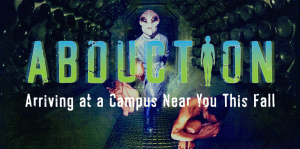
[ad_1]
For Immediate Release:
November 13, 2023
Contact:
Kendall Davis 202-483-7382
Berkeley, Calif. – To encourage empathy for animals suffering in university laboratories, peta2, part of PETA’s youth division, is visiting the University of California–Berkeley tomorrow with Abduction, a unique virtual reality experience landing on college campuses across the country. In this eerie experience, visitors will enter a mysterious truck containing a mobile virtual reality studio. The students will seemingly find themselves stranded in the desert with a couple of fellow humans, abducted by aliens, taken aboard a spaceship, and subjected to a shocking experience, similar to what animals endure in laboratories. They’ll watch as their friends are subjected to painful tests—knowing that they’ll be next.
When: Tuesday, November 14, 11 a.m.–4 p.m.
Where: Dwinelle Plaza, University of California–Berkeley
Watch the trailer here. Broadcast-quality footage of the Abduction virtual reality experience is available upon request.

At the University of California–Berkeley, experimenters used mice who were specifically bred to display symptoms of autism spectrum disorder, carving out a portion of their skulls so they could observe and manipulate their brain activity. Experimenters implanted headposts on the mice and secured their individual whiskers into separate tubes to test their sensitivity before forcing the mice to perform various tasks in complete darkness for five days a week. All the mice were killed and dissected.
In another experiment, mice were deliberately infected with tick-borne pathogens, which are known to cause paralysis, severe skin lesions, facial swelling, and other symptoms. Once their disease progression was deemed severe enough, the mice were killed by carbon dioxide asphyxiation and spinal dislocation.
Experimenters also subjected guinea pigs, who were only 2 weeks old, to experience nearsightedness by inserting vision-distorting contact lenses in their eyes daily before the young animals were killed.
“Many students don’t know that on their own college campuses, frightened and confused animals are being psychologically tormented, mutilated, and killed in laboratories, with no way to escape or even understand what’s happening to them,” says Senior Director of peta2 Rachelle Owen. “peta2 is on a mission to open young people’s eyes to this cruelty, help students understand what it feels like, and motivate them to join our call for a switch to superior, non-animal research.”
Studies show that 90% of all basic research—most of which involves animals—fails to lead to treatments for humans, which is why the group is pushing universities to pivot to sophisticated, human-relevant research methods.
Abduction—which was filmed in VR180 with assistance from the immersive content creation studio Prosper XR—has stopped at nearly 50 other college campuses over the past year, including Harvard University, the Massachusetts Institute of Technology, the University of California–Los Angeles, and the University of Texas at Austin.
PETA—whose motto reads, in part, that “animals are not ours to experiment on”—opposes speciesism, a human-supremacist worldview. For more information on PETA’s investigative newsgathering and reporting, please visit PETA.org, listen to The PETA Podcast, or follow the group on X (formerly Twitter), Facebook, or Instagram.
[ad_2]
Source link

Leave a Reply